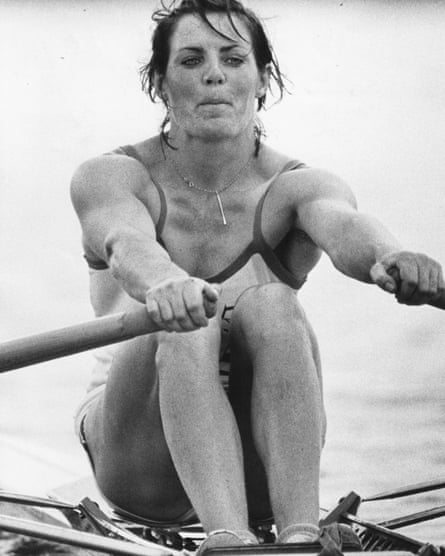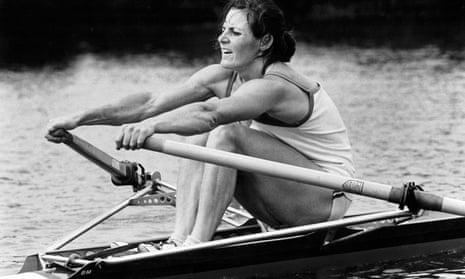Beryl Crockford, who has died aged 66 after a cycling accident, was one of the first two British women to become a rowing world champion when she and her partner, Lin Clark, won the lightweight double sculls in Hazewinkel, Belgium, in 1985. The pair first rowed together at the 1976 Montreal Olympics, the first Olympic regatta to include rowing events for women.
After Montreal, Beryl, who rowed under the name Mitchell until she married Duncan Crockford in 1985, ploughed her own furrow in a single scull, taking part in the 1980 and 1984 Olympics. She first stepped on to the podium in 1981 in Munich, where her silver was the first world championship medal won by a British woman, 19 years after her coach, Penny Chuter, had become the first to win a European medal.
As the Observer said at the time: “She sculls with a blend of power and grace which is as menacing to her opponents as her euphoric smiles are charming to the crowds who witnessed her race at Munich.”
After finishing sixth at the Los Angeles Olympics in 1984, Beryl questioned the point of competing against giants when she stood at 5ft 7½in and weighed only 10½ stone. She teamed up with Clark once more and determined to forgo her passion for cake and chocolate to lose 20lb and qualify as a lightweight. At the world championships they struck gold in the double sculls – and celebrated with a cake spree worthy of the Great British Bake Off.
Beryl tore through her sporting life with feistiness, cussedness, cheerfulness, controversy and determination second to none. “She was totally driven in everything that she did,” said Chuter. “She was accident-prone – like the time that her hairdryer sparked a blackout in the team hotel at a Swiss regatta.” In 1982 she came off a toboggan in Richmond Park and fractured her skull, resulting in a facelift and what she described as a “reverse punk hairstyle” reminiscent of her hero, Andy Capp.
She was an irritant to the Amateur Rowing Association (now British Rowing) – which, she once said, aimed to make everyone run-of-the-mill. When it came to funding in those pre-Lottery days, Beryl did not pussyfoot. She burst through doors and charmed chief executives into sponsoring her: Marks & Spencer supplied Chuter with a coaching launch, British Home Stores expanded their support to the whole women’s team, and Flymo, the lawnmower makers, gave her boats.

In 1985 Beryl wrote a begging letter to Tampax. It never occurred to her to be squeamish at the thought of a sanitary manufacturer’s name emblazoned on the bows of her boat or plastered over their sweatshirts as she and Lin were interviewed on television. After weeks of dithering, Tampax rejected the opportunity because the Independent Broadcasting Authority had banned the advertising of feminine hygiene products. Instead, the women secured sponsorship from Playtex bras and wore T-shirts proclaiming: “Thank goodness it fits”.
In 1982, Henley Royal regatta introduced an invitation event for women’s single sculls that was tailor-made for Beryl. She won the final, against Stephanie Foster of New Zealand, and the success of the event set the scene for the introduction of events for women a few years later. When the exclusive Leander Club voted to admit women in 1997, she was the first to join.
Born in London, Beryl was one of three children of Jack Martin, an architect’s draughtsman, and his wife Patricia (nee Collins), a nurse. She attended Gilliatt comprehensive school in Fulham and the Lycée Français in Kensington. As a schoolgirl she joined St George’s Ladies rowing club in Chiswick before moving to Thames Tradesmen.
She trained as a dance teacher at Eastbourne College before turning to PE, of which she was an inspiring teacher and college lecturer throughout her competitive career.
When Beryl hung up her sculls, she gained coaching qualifications in several sports but specialised in rowing. She became a part-time national team coach, and in the 1990s transformed Lady Eleanor Holles school in west London into the most successful junior women’s rowing club in the country, a nursery for future internationals.
In 2002 the Crockfords moved to Australia, where Beryl coached many clubs and schools, including octogenarians at Drummoyne RC and juniors at Sydney Boys high school as head coach. Throughout her career, she specialised in counselling and aiding the most vulnerable children. Beryl did everything full-on, including working as a volunteer at the London 2012 Olympics and Paralympics. She was, in Lin Clark’s words, “a complete one-off”.
She remained a fitness fanatic until the day she died after colliding with a parked vehicle while on her regular 50km cycle ride in Sydney’s Olympic Park in preparation for the Paris-Brest-Paris ride in 2019.
Her six-year marriage to Barry Mitchell was dissolved in 1979. She is survived by Duncan, their son Daniel, a sister, Jacqueline, and a brother, Richard.

Comments (…)
Sign in or create your Guardian account to join the discussion